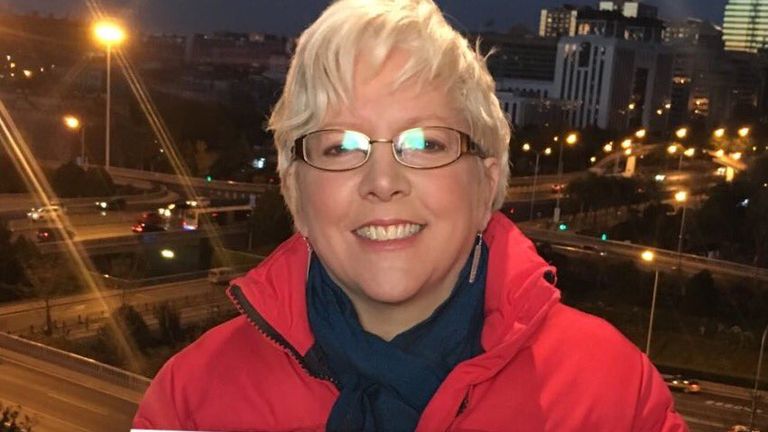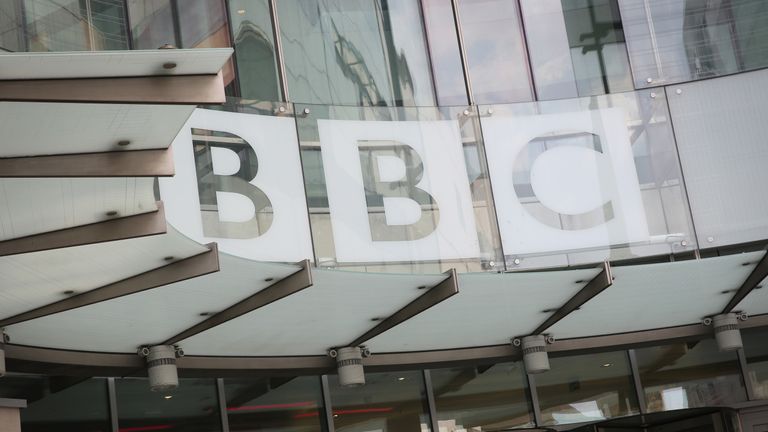BBC China editor Carrie Gracie quits post, saying: 'I want equality, not more money'
Carrie Gracie resigns from her job in Beijing, saying she could not go back to China and "collude in unlawful pay discrimination".
Monday 8 January 2018 15:06, UK
One of the BBC's top journalists has hit out at the corporation over its unfair pay structure, insisting "I didn't need more money, I just needed to be equal".
Carrie Gracie resigned from her position as China editor after discovering that male colleagues were earning 50% more than women in the same role.
Speaking on Radio 4's Woman's Hour, she said: "In October the BBC made me a pay offer. My pay is £135,000 and the BBC offered to raise that to £180,000.
"But I was not interested in more money I was interested in equality. I kept saying to my managers I didn't need more money, I just needed to be equal."
Last July, the BBC was forced to publish the pay levels of its top earners revealing that two-thirds of those in the top bracket were men.
Ms Gracie lodged a formal grievance against the BBC, saying: "I just decided enough is enough. For six months it has made me very unhappy, it's been a huge amount of work to try and put it right".
Speaking about her former role, Ms Gracie said: "I see the job of China editor as one of the most important and difficult reporting jobs of our time. I chase around under surveillance, dealing with intimidation and police harassment. I try to put everyone from yak herders to communist party officials on camera in a heavily censored one party state."
Despite the corporation's offer of a £45,000 pay increase, she said: "I didn't feel it was a solution, I felt it was a divide and rule-botched solution that would not make the BBC better."
She went on: "Every day I go out without fear or favour, facing intimidation in China, telling the story and shining a light… I'm not going to not shine a light when I find a problem in my home organisation that needs saying."
Calling the current BBC pay system "neither equal, nor fair nor transparent", Ms Gracie said "salaries at top are unacceptably high - for presenters, stars of various kinds and managers".
She also stood by her earlier statement, , that there was a "secretive and illegal pay culture" at the BBC.
Ms Gracie concluded: "I could not go back to China and collude knowingly in what I consider to be unlawful pay discrimination. Nor could I stay silent and watch the BBC perpetuate a failing pay structure by discriminating against women."
Ms Gracie has resigned her position in Beijing, but continues to work for the BBC in her former post in their London newsroom.
She has worked for the BBC for 30 years and was appointed in the newly created China editor role four years ago.
In response to Ms Gracie's open letter, the BBC said: "Fairness in pay is vital. A significant number of organisations have now published their gender pay figures showing that we are performing considerably better than many and are well below the national average.
"Alongside that, we have already conducted an independent judge led audit of pay for rank and file staff which showed 'no systemic discrimination against women'.
"A separate report for on-air staff will be published in the not too distant future."
Fellow female BBC journalists including Kirsty Wark, Clare Balding, Emily Maitlis and Sarah Montague have all tweeted in support of Ms Gracie's case.
Nearly 200 women have lodged grievances against the BBC over pay since last summer's pay disclosure.
The outcome of Ms Gracie's case has not yet been decided.





